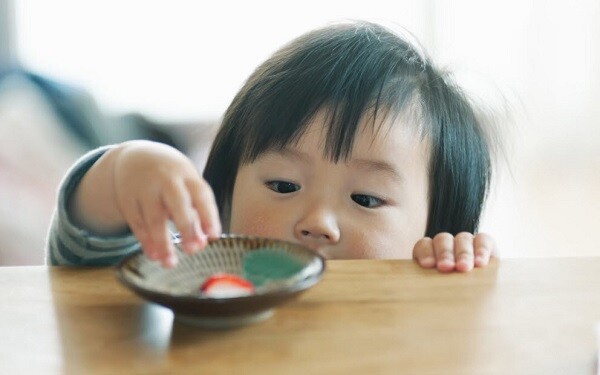At a birthday party in the park, children were playing and enjoying delicious treats. A group of kids sat around a table with a cake and drinks. As everyone was laughing and having a good time, a boy named Minh noticed an enticing piece of colorful cake on his classmate’s plate, which hadn’t been shared yet.
Out of curiosity and without thinking to ask his friend first, Minh quickly reached out and touched the cake, getting it all over his fingers. This action not only surprised his parents but also made the other children around him feel uncomfortable.
When Minh’s mother saw him touching his friend’s food, she immediately intervened and said, “Minh, could you please ask your friend before taking their food? We need to respect other people’s belongings.“

Illustration photo.
After the situation was under control, Minh’s mother sat down with him and explained, “You know, touching other people’s food without asking is impolite.“
In today’s society, where children are exposed to various environments, it is essential to understand and practice proper etiquette to ensure harmony and safety for themselves and those around them.
Therefore, educating children about proper behavior helps them develop social skills and create a harmonious living environment for everyone.
Teaching children how to behave appropriately when playing in public is a continuous process that requires patience from parents. When children learn to behave appropriately, they will become responsible and respectful individuals. Psychological expert Quang Thi Mong Chi provides further analysis on this issue and offers appropriate advice for parents to better educate their children.

Psychological expert Quang Thi Mong Chi.

Dear expert, what are some civilized behaviors in public places that children should follow?
“Teaching children from an early age” is always necessary for every parent to educate their children to grow up and become good people. Therefore, from an early age, children should be taught the positive rules and regulations of culture and society. Teaching children to follow civilized behaviors in public places helps them develop community awareness and behave appropriately when going out. Here are some civilized behaviors that children should follow.
Maintain public hygiene and respect public property: Children should be taught to dispose of trash in designated places, not litter in public places, and know how to protect and not vandalize public property such as benches, trees, and other public facilities. This contributes to environmental protection and keeps public spaces clean.
Remain silent when necessary: In places that require quiet, such as libraries, movie theaters, or hospitals, or in crowded places like restaurants and supermarkets, children should know to keep quiet or speak softly to avoid disturbing others.
Line up and avoid pushing: Children need to learn how to line up and wait for their turn in public places like supermarkets, bus stations, or when participating in group activities. They should avoid pushing or shoving others and instead practice patience and respect for personal space.
Greet, thank, and apologize: Children should be taught to greet people, say thank you when helped, and apologize when they make a mistake. This helps them to be mindful and considerate of their actions and show respect to others.

What should parents do if their child does not follow the rules of conduct (touching food in a restaurant, taking someone else’s food, shouting, throwing a tantrum, etc.) without making the child feel ashamed or pressured?
When children do not follow the rules of conduct in public places, it is important for parents to respond calmly and provide clear guidance on appropriate behavior to avoid making the child feel ashamed or pressured. To handle this situation effectively, you can apply the following approach.
First, parents need to stay calm and not scold the child in front of others or punish them on the spot. Instead, gently remind the child or take them to a more private place to discuss the matter. This helps to protect the child’s self-esteem and prevents embarrassment in front of a crowd.
Second, parents should explain why such behavior is inappropriate. Instead of just saying, “You shouldn’t do that,” explain why the action is not acceptable. For example, if the child touches food in a restaurant, parents can say: “We shouldn’t touch other people’s food because it may contaminate it, and it’s not good for everyone’s health.“
Third, guide the child by offering alternative, more appropriate choices. For instance, instead of taking someone else’s food, parents can suggest: “If you want to eat something, ask me, and I’ll buy it for you.“
At the same time, when the child behaves appropriately, praise them specifically for their actions. This recognition will greatly motivate the child to improve their behavior.
After the incident, discuss with the child what happened. Ask them how they felt and guide them on how to handle the situation better next time.
Especially, parents should not mention shame as a form of reprimand. Saying “You make me so ashamed” can make the child feel pressured and not understand how to correct their behavior. Parental reactions need to balance between educating the child and protecting their self-esteem. Maintaining calmness, gently explaining, and guiding appropriate behavior will help the child learn without feeling pressured or ashamed.

Should parents use punishment or rewards to encourage children to behave appropriately and not play in public places? If so, how should this be applied?
Parents can use both punishment and rewards to encourage children to behave appropriately in public places, but it is important to do so in a balanced and reasonable manner. Both punishment and rewards can help children understand the difference between good and inappropriate behavior, but the implementation should support the child’s positive development rather than create pressure or negative reactions.
First, regarding the use of rewards, this is an effective tool to encourage children to behave appropriately. However, rewards should be used skillfully, focusing on encouraging positive behavior rather than creating material dependence.
To achieve this, parents should effectively utilize forms of rewards such as verbal praise, small gifts, or long-term rewards depending on the situation. With verbal praise, this is the most effective and simplest method, and it should be done immediately when the child exhibits good behavior.
Statements like “You’re so well-behaved for not shouting in the restaurant” help the child understand that their behavior is appreciated by their parents. If the child follows the established rules, parents can reward them with something small, like choosing a toy or having extra playtime.
Additionally, parents can implement a point-based reward system. When children accumulate enough points from good behavior, they can redeem them for a larger reward (e.g., a family outing).
As for punishment, it should be used correctly to avoid psychological harm to the child. The goal of punishment is to help children recognize their mistakes and learn to adjust their behavior, rather than create fear or shame. A reasonable form of punishment is one that is mild and related to the misbehavior.
For example, if the child misbehaves and doesn’t listen in a restaurant, you can temporarily restrict them from using their favorite toy for a short period. Another form of punishment that many parents apply is asking the child to sit quietly and think about their actions.
Especially, parents should not use physical punishment on the child. Physical punishment, such as spanking or scolding, not only fails to teach the child but can also harm their psychology and increase aggression. The child may imitate this behavior when they encounter unpleasant situations.
Finally, the most important thing is to maintain a balance between rewards and punishment. Children need to understand that good behavior will be recognized and encouraged, while inappropriate behavior will have consequences. However, both rewards and punishment should be based on educational goals and character-building, without creating undue pressure or anxiety.

What activities can parents do with their children to develop their understanding of respecting public spaces and others in public environments?
There are numerous activities that parents can do with their children to help them develop an understanding of respecting public spaces and others in public environments. Here are some specific activities for parents to consider and apply with their children.
Simulate public place scenarios: Parents can create hypothetical situations such as going to a restaurant, supermarket, or park, and guide their children on how to behave politely in these circumstances. For example, ask them to line up and wait for their turn, not shout or scream, and give way to others.
Teach children during family meals: Parents can teach children basic principles during mealtimes, such as not making noise, not touching other people’s food, and speaking softly. These skills will easily transfer when children are in public places.
Take children to public places with clear rules: Visit places like museums, libraries, or theaters, where children can practice maintaining order and respecting the space of others. Guide them on how to remain quiet, walk gently, and not touch displayed objects.
These activities help children learn to adjust their behavior in public places. Alternatively, take them to a park to teach them about sharing play space with others, taking turns on the slide, and respecting the distance of those around them.
Parents can also read books with their children about rules of conduct, such as not pushing, not speaking loudly in public places, and respecting personal space. Illustrative stories help children visualize and remember more easily. After reading, discuss with the children the do’s and don’ts in specific situations, so they understand appropriate behavior in practice.
Parents can also play role-playing games with their children, such as going shopping, eating at a restaurant, or taking the bus. Parents can act as servers or salespeople, while the children play the role of customers. This game helps children practice lining up, saying thank you, and behaving appropriately with others.
Another option is to engage in community activities with your child, such as volunteering, taking classes, or joining clubs. Parents can participate in community activities like cleaning up a park or helping the elderly. These activities help children develop a sense of community respect and learn to care for shared spaces.
When children attend classes or clubs, such as music, sports, or art, they will learn to respect the space and rights of their peers and follow common rules.
Equally important is for parents to set a good example for their children, as children often learn by observing adult behavior. When in public places, parents should model polite behaviors such as holding doors for others, not speaking loudly, and waiting in line. Children will absorb these behaviors through observation.
Additionally, encourage children to self-evaluate their behavior by asking them about their feelings after following the rules in a public setting or how they felt when everyone maintained order.
This helps children reflect on their actions and develop self-awareness. These activities gradually teach children to understand and practice principles of respecting public spaces and others, fostering good social skills in public environments.





































